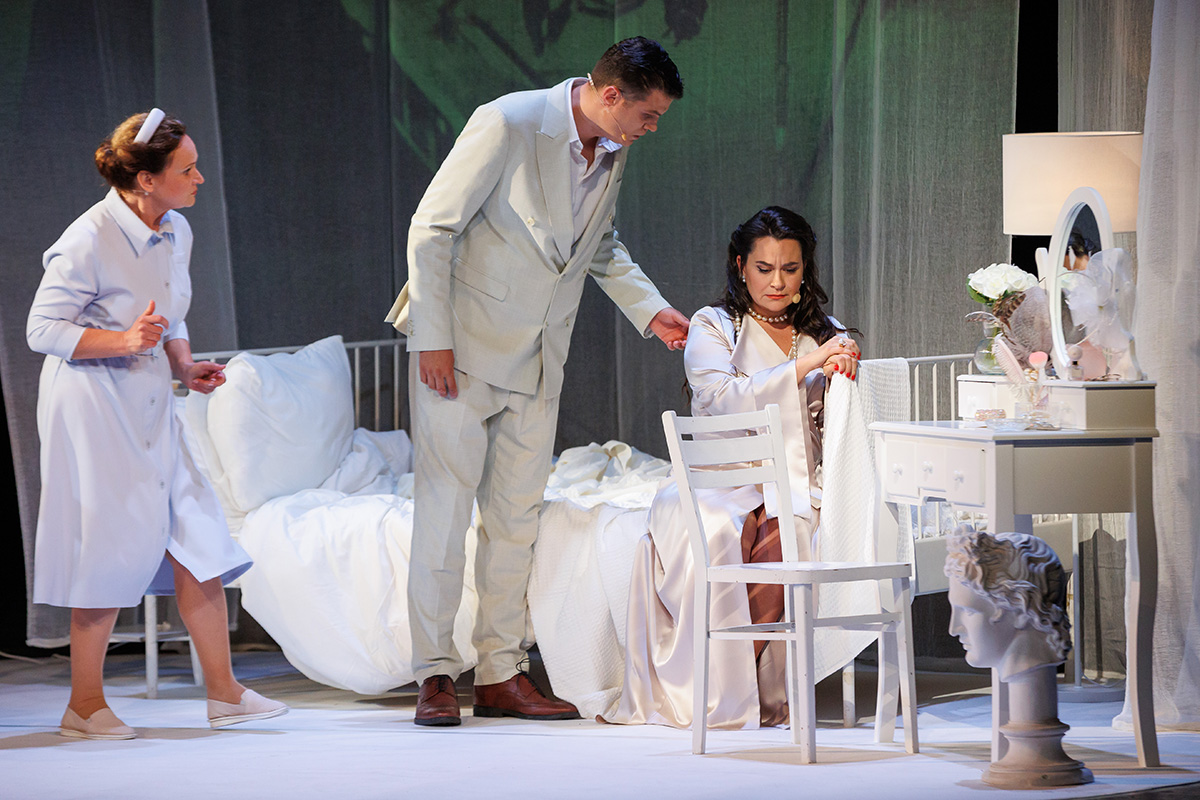- October 11, 2023
- 654
Ordonówna affects next generations of Poles

One of the most anticipated proposals that the Polish Theatre “Studio” has recently presented to the audiences is undoubtedly the play “Ordonówna”, recalling the fate of Hanka Ordonówna.
– Interest in the performance was huge. The tickets for October 3rd were sold out so quickly that we decided to have one more performance the following day” – Lila Kiejzik, the director of the play, tells “Kurier Wileński”. – Many people came to see the performance again, a group of senior citizens from Augustów also came especially for the performance. Of course, I was very pleased that there was no shortage of young people in the audience, as this means that we will have someone to play for in the future” – she adds.
The performance was indeed very much to the liking of the Vilnius audience, which was best evidenced by the full halls and warm applause. The role of Hanka Ordonówna was played by singer Ewelina Saszenko, for whom this was an acting debut. Her partner on stage in the role of Count Michał Tyszkiewicz was Oskar Wygonowski, while the nurse was played by Alina Masztaler.
– We can see that our Polish theatrical community in Vilnius is growing, that more and more young professional actors are appearing, such as Oskar Wygonowski, who also wants to act in Polish. Ewelina Saszenko, from whom the proposal to create a musical performance about Ordonówna came from, did an excellent job with the role and I would very much like us to show this play many more times. As a director, I had the impression that with every performance it gets better and better, the actors and the audience interact more with each other, and that it really is a unique experience – says Lila Kiejzik.
Undoubtedly, an additional advantage was the place where the performance was staged, the theatre in Pohulanka (now Vilnius Old Theatre), i.e. the same stage where Ordonówna actually performed in Vilnius during the war. Although the action of the play was set in Beirut, where she became seriously ill and died, it is her memories of Vilnius that form a very prominent part of the performance. This probably made the show even closer to the Vilnius audience. The songs, the actors’ performance, but also the real fate of Ordonówna, which at the same time is a history lesson about the fate of Poles during this difficult period, are moving.
After the outbreak of World War II, Ordonówna initially stayed in Warsaw, but in the autumn 1939 she was imprisoned at the Pawiak prison. Released thanks to her husband’s efforts, she left for Vilnius, where she played in the Theatre on Pohulanka, as well as in “Lutnia” and the Polish Dramatic Theatre. Arrested once again, this time by the NKVD after the annexation of Lithuania by the USSR, she was deported to a gulag in Uzbekistan and her husband to the depths of Russia. During her exile, her lung disease returned, from which she never recovered. After her release from exile, following the Sikorski-Mayski Agreement, she became involved in organising help for the orphaned children of Polish exiles. After the USSR broke off relations with the Polish Government (after the Katyn massacre was revealed in 1943), she was evacuated with the orphanage via Bombay in India to Beirut in Lebanon, where she lived with her husband and began treatment, but to no avail.
Play “Ordonówna”
Directed by: Lilia Kiejzik
Screenplay: Sławomir Gaudyn
Sound and light: Artur Armacki
Accompaniment: Paulius Zdanavičius
Cast: Ewelina Saszenko, Oskar Wygonowski, Alina Masztaler
The project was co-financed by the Chancellery of the Prime Minister of the Republic of Poland as part of the “Polonia and Poles Abroad 2023” competition, as well as by the Embassy of the Republic of Poland in Vilnius as part of the “Idy Teatralne 2023” project.
This cultural event is a reminder of the strong cultural ties between Poland and Lithuania and of Hanna Ordonówna’s artistic legacy on Lithuanian soil.
Translated by Katarzyna Korniak within the framework of a traineeship programme of the European Foundation of Human Rights, www.efhr.eu.

